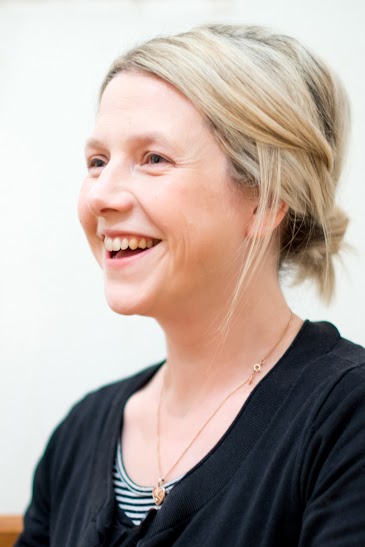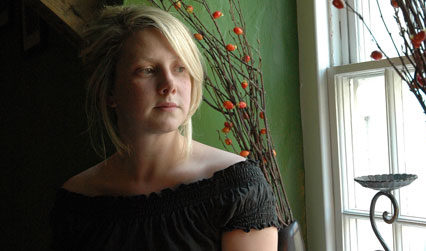Sarah Reynolds recently caught up with prize-winning novelist, short story writer, screenwriter and musician Fflur Dafydd.
—————————————————————————————————————————
Fflur Dafydd is a prize-winning novelist, short story writer, screenwriter and musician. The first female author ever to have won both the Prose Medal and the Daniel Owen Memorial Prize at the National Eisteddfod, she won the Oxfam Hay Emerging Writer of the Year Award 2009 and is also an award-winning singer-songwriter. The second series of her critically acclaimed television series Parch will air on S4C in September and her first feature film The Library Suicides premieres at the Edinburgh International Film Festival in August.
I feel I should confess partiality upfront – I am a fan. I have known Fflur since our first babies were small and in some ways I know the writer better than I know her writing. A Welsh learner, I have not yet been brave enough to tackle Atyniad’, ‘Y Llyfrgell or Awr y Locustiaid. I am much better acquainted with Fflur’s writing in English. The White Trail is a luminous reworking of the ancient Welsh myth, Culhwch and Olwen. Twenty Thousand Saints is a literary thriller but also an insightful study of community and identity.
It isn’t strange to talk about writing with Fflur, but it’s odd to speak to her in English and to record the conversation. Normally, our literary dissections are unfocussed affairs, conducted  over a din of kids performing ‘Cyw’ classics on a karaoke machine. Discussions on the nature of magic realism are punctuated by requests for orange squash and jam sandwiches. We speak in quick bursts, cramming ideas into the stolen moments between our children’s demands.
over a din of kids performing ‘Cyw’ classics on a karaoke machine. Discussions on the nature of magic realism are punctuated by requests for orange squash and jam sandwiches. We speak in quick bursts, cramming ideas into the stolen moments between our children’s demands.
My first question is barely out of my mouth when we are interrupted by Luned, Fflur’s youngest daughter. A brief inquiry ensues as to the ownership of a certain Thomas the Tank vest; our children are forever swapping clothes. We fob off poor Luned with a ham sandwich and a promise that we won’t be long. This will be a quick fire round of questions.
Sarah Reynolds: Your latest short story, ‘Devereaux Drive’, was commissioned as part of the Story: Retold series. I believe it is a take on the Siân James story, ‘Hester and Louise.’ What was it about the story that appealed to you?
Fflur Dafydd: The story is about a grandmother and her granddaughter initially – a story within a story. I have a recollection of when my grandmother died, several years ago. I walked around Carmarthen in a daze just thinking about her, walking past her house, lost in a pathway of grief. That struck a chord with me; how you deal with grief, in a physical sense.
Sarah Reynolds: I have a hunch about the inspiration for ‘Devereaux Drive’. I can picture the bungalow you describe so clearly – could it be something you thought of on one of your daily walks?
Fflur Dafydd: Like a lot of writers, I like to go for a ‘power walk’ to clear my head and resolve any narrative problems that I might be having with my writing. Devereaux Drive is on my route and every time I pass it, I feel that it’s one of those other worldly places, as if you could just walk down that street and find yourself in Australia. In Carmarthen you can have one street of middle class people and only a hedge separates them from the next street that’s full of working class people, all living side by side and not really aware of each other. With all the walking around I do, I find I’m always encountering the strange and the unfamiliar in a town I thought I knew really well. The story was an amalgamation of all these ideas coming together on that walk round. It’s quite funny that the walk itself has become part of the narrative.
Sarah Reynolds: This isn’t your first foray into adaptation. The White Trail was written as a response to the Mabinogi story Culhwch and Olwen, you wrote Twenty Thousand Saints as an English language version of Atyniad and you have written a screenplay based upon your prize-winning novel, Y Llyfrgell. You are becoming an expert in adaptation. How does it compare to starting from scratch?
Fflur Dafydd: Writing this short story was easier than writing something from scratch. I’m so used to adaptation that sometimes it’s daunting to be left alone with my own imagination. The ‘Hester and Louise’ story excited me because I had a challenge, a template, I was responding to something. When you’re reworking something, you create something that you wouldn’t have been able to create by yourself. There’s an influence, an interesting twist to the material because it’s reacting to something else. All those interesting themes in the Siân James story, I wanted to displace, to pull them apart, put them in a different setting in order to find something contemporary.
Sarah Reynolds: You seem to switch effortlessly between screenplay, short story, novel and songwriting. I wonder if this ability to switch modes is something that is informed by being both a writer and a mother?
Fflur Dafydd: When your personal life is taken over by little beings, you get used to living in this strange universe where your mind is half elsewhere and half on the physical tasks that you have to perform to make sure that everybody’s okay. I’m always switching between childcare and professional modes and sometimes the two mingle. I’ve found myself writing with a child on my lap or breastfeeding while I complete an edit. You get used to the fact that you can’t just give your whole being over to one medium. Mothers are high-functioning beings.
As if to underscore this point, Luned returns to the kitchen clutching a frock from the dressing up box.
Right now as I’m trying to answer your question, I’m putting a Frozen dress on my youngest daughter. And she is looking at me quizzically, unable to understand why her mother is speaking English. Switching languages is another example of that adaptability. Being bilingual, you have to function on a different level to most people because you’re always switching back and forth between the two languages – even mid sentence sometimes, when you realise that someone doesn’t understand. Adaptation is just what I do. It all adds to the functionality of the working mother.
Sarah Reynolds: ‘Devereaux Drive’ has a strong plot. That’s not always the case with short stories. How important to you is plot in fiction?
Fflur Dafydd: As a reader, I like to be gripped by a book and that’s always driven by narrative.
When I started out, in Welsh, I was more experimental with language and form and as I’ve grown older, I’ve become more structured in the way that I write – in English, even more so. Twenty Thousand Saints was a structured thriller where its Welsh language predecessor, Atyniad, was not. It was impressionistic and had a lot of different voices.
Sarah Reynolds: You have just finished writing the second season of Parch – an eight-part television series for S4C. Do you think that writing for the screen has affected the way you write fiction?
Fflur Dafydd: Absolutely. The language I use has become sparser than ever – it’s all the paring down that you do with dialogue within a screenplay. What interests me most, writing fiction now, is the visual, and what can be conjured in the visual – I’m interested in the optical illusion that I can create with words.
Sarah Reynolds: There are some fantastic visual images in ‘Devereaux Drive’. My favourite line is: “He searched around for the gloves, finding them in halted applause on a hat stand behind the door, a hook for each palm.”
Fflur Dafydd: I’m glad you liked that line – I took a long time thinking about that. There’s something arresting about yellow rubber gloves. I wanted to transform these domestic things – these things that I have to deal with weekly, when I’m scrubbing my toilet. They can be beautiful things! I’m interested in transforming the mundane into something beautiful. It’s that same notion that I’m pursuing in the film, The Library Suicides. The library might be thought of as a dull, uninteresting space and yet the aim is to turn it into a beautiful set – to throw blood over books, to make the ordinary, extraordinary.
Sarah Reynolds: One last question: Tell us about The Library Suicides – the film adaptation of your prize-winning novel, Y Llyfrgell.
Fflur Dafydd: It began as an idea back in 2001 when I had a glimpse into the mysterious underground corridors at the National Library of Wales but it was another seven years before I actually sat down to write the novel. The Kindle had just been launched and with it, the idea of the digital book. I thought about creating characters that were mirroring one other, where one of them represented the original, and the other one represented the copy. So it became a story about twins. I had this image of twins in the bath; in fact, that opening paragraph was the first thing I wrote. The Daniel Owen memorial prize was coming up so I only had six months to write the novel. I’d always had the idea of making it into a film. I’d worked with a wonderful director called Euros Lyn – his vision as a director was incredible. He seemed to be able to translate what was in my imagination onto the screen. It took many years but we managed to secure funding for the film and then to make it. It’s been a long gestation process but now that it’s finally here, it feels like a dream come true.
—————————————————————————————————————————
I could talk to Fflur all day but parenthood intervenes. The witching hour is upon us – that time of day when the children take on a last gasp of mania before succumbing to baths and bed. The level of noise has reached fever pitch. A game of ‘catch the soft toy’ has taken on a feral vigour; poor one-eyed Ted has become a missile. Just as I volley my final question at Fflur, battered Ted is launched on a collision course for her face. Typically for Fflur, she manages to stay focussed, deflecting the teddy and answering the question without flinching. It’s like watching Wonder Woman catch a bullet.
As Fflur hustles the kids into their jackets and out of the door, we slip back into Welsh to say our farewells until next time. Clutching school bags and umbrellas, she corrals her troops, stepping outside and into her other self, effortlessly – as ever, the mistress of adaptation.
The Library Suicides will have its UK premiere at The Edinburgh Film Festival, 17th June 2016, with a Welsh premiere to follow at the National Eisteddfod. It will also be screened at Chapter Arts Centre, Cardiff and Aberystwyth Arts Centre, between the 5th and 11th of August 2016.












